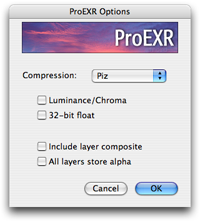The answer is: not necessarily. But only CS3 Extended does layers in floating point (32 Bits/Channel mode), so other versions won't have access to what I consider to be the biggest feature in ProEXR.
If you're OK with that and still interested in a variety of compression options and retention of color information, go ahead and try it in regular CS3 or in CS2 (the first version that had floating point). While not officially supported, I will admit that a little testing was done in those versions and some code was added to make ProEXR work in them. And heck, it runs in trial mode for 15 days, so try it.
On the After Effects end, I would have loved to get the OpenEXR plug-ins working back in AE7, but it shipped with a bug that prevented floating point images from having 3D Channels. So you really do need CS3 to run those.
